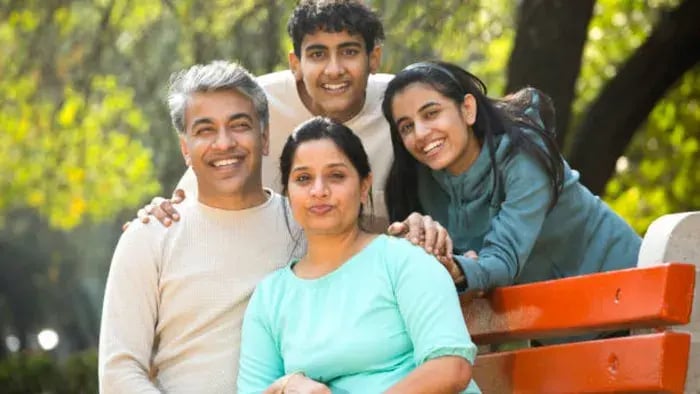- Nuclear Family Explained Simply
- Personal Space And Privacy
- Quick Decision Making
- Focused Parenting
- Limited Support System
- Less Social Interaction at Home
- More Parental Pressure
- Built-In Support System
- Strong Cultural and Moral Values
- Shared Responsibilities
- Limited Privacy
- Too Many Parenting Opinions
- Safety Net
- Cultural Connection
- Support During Key Moments
- Distance Can Limit Daily Bonding
- Inconsistent Involvement
- Conflicting Values
- More Time for Self-Growth
- Financial Freedom
- Social Expectations And Pressure
- No Daily Interaction With Younger Generation
- Concerns About Aging Alone
- Expanded Support Network
- Learning Adaptability And Empathy
- Shared Responsibilities And Growth
- Trust And Bonding Take Time
- Different Parenting Styles
- Emotional Baggage From Past Relationships
- Modern Family Dynamics
Family plays a crucial role in building the foundation of a child's life. From emotional to mental strength, children see and learn how to handle difficult situations. Families may look different, such as Nuclear, Joint, and Extended families. Each aspect has its own benefits and challenges when it comes to children's growth and development. It is crucial to understand the basics of these types of families so parents can know which might suit their family best.
A nuclear family is where only parents and their kids live together. This gives kids the space to be independent, and it is a parenting style that only focuses on them. On the other hand, a joint family is a household where multiple generations live together, from grandparents to aunts and uncles, all under one roof. Here, the family follows traditions passed down through generations and is also a great environment for emotional support. Extended families may not live together under one roof, but they are deeply connected through interaction, emotional closeness, and values.

A nuclear family is where only parents and their kids live together. This gives kids the space to be independent, and it is a parenting style that only focuses on them. On the other hand, a joint family is where multiple generations live together, from grandparents to uncles and aunties, all under one roof. Here, the family follows traditions passed down through generations and is also a great environment for emotional support. Extended families may not live together under one roof, but they are deeply connected through interaction, emotional closeness, and values.
Each type of family influences how children learn discipline, communication, and their role in a group. Recognizing those differences can help build understanding and respect in diverse communities.
Why Children Should Understand Family Diversity
Understanding family diversity helps children develop empathy, respect, and social awareness from an early age. Learning about types of families explained for kids allows children to recognize that families can look different while still offering love, care, and support. This understanding reduces judgment and helps children interact confidently with peers from varied backgrounds. Awareness of different family setups also supports emotional intelligence by teaching acceptance and flexibility. When children learn about family types for children, they become more open-minded and better prepared to navigate diverse social environments with kindness and understanding.
Understanding How Nuclear, Joint, And Extended Families Work
Every family has its ways, but all share the goal of loving, protecting, and supporting their children. Here’s a closer look at how they differ and their pros and cons.
Nuclear Family Explained Simply
A nuclear family consists of parents and their children living together in a household. This unit functions independently with focused decision-making, daily structure, and flexibility. This type of family dynamic is common in urban settings where both parents are working.
Benefits Of A Nuclear Family
Personal Space And Privacy
In a nuclear family, every member has more space, both physically and emotionally. Children have time for self-reflection and can do their thing without much interference, while parents have clear boundaries and a routine.
Quick Decision Making
With fewer people involved in daily decisions, parents can act faster, whether it’s about school, travel, or setting house rules. This helps to bring stability and consistency in a child’s life.
Focused Parenting
Parents in nuclear families tend to be more involved in their children’s education, hobbies, and emotional development. With fewer distractions, their involvement feels more personal and attentive.
Nuclear Family Challenges
Limited Support System
When both parents are working or busy, managing a child’s daily needs or handling emergencies alone can be overwhelming. With less support and help, there’s no one to fall back on.
Less Social Interaction at Home
Without extended family living under the same roof, children often miss out on the everyday bonding that comes from growing up with cousins or having grandparents nearby. These interactions help kids learn to share, cooperate, and understand different age groups. Grandparents often pass down stories, traditions, and values, while cousins bring play, companionship, and a sense of belonging.
More Parental Pressure
In a nuclear family, parents often take on the entire responsibility of raising children without the day-to-day support of grandparents or other family members. From managing school routines, homework, meals, and after-school activities to balancing jobs and household chores, the mental and physical load can become overwhelming. This constant juggling can lead to fatigue, reduced patience, and emotional burnout.
What is a Joint Family?

A joint family is where multiple generations and relatives, grandparents, uncles, aunts and cousins live together. This is a typical family type in Indian culture, rooted in shared resources, traditions, and values.
Benefits of a Joint Family
Built-In Support System
In a joint family, kids are never alone. Someone is always there to guide, supervise, or care for them. This gives them emotional security and a sense of belonging.
Strong Cultural and Moral Values
Living with elders helps children learn respect, discipline, and traditions naturally. Whether it’s morning pooja, family meals, or festive rituals, learning happens through observation.
Shared Responsibilities
In a joint family, the duties are divided from meal prep to child care. Parents get some breathing space, and children also learn the value of teamwork and cooperation early.
Joint Family Challenges
Limited Privacy
Personal space can be hard to find, and children may feel overwhelmed if they don’t get quiet time or space to be alone.
Too Many Parenting Opinions
Multiple adults involved in decision-making can lead to inconsistency in rules or confusion for children.
Conflicts In Lifestyle Choices
Differences in thinking, whether regarding food, clothing, or how to manage finances, can lead to tension, especially across generations.
What Is an Extended Family
An extended family includes relatives like grandparents, cousins or uncles and aunts who don’t live in the same house but are closely connected through regular visits, celebrations, or family support.
Benefits of an Extended Family
Safety Net
Children form bonds beyond the immediate household and know they are looked after by a wider circle. This fosters trust, confidence, and emotional balance in children.
Cultural Connection
Through family gatherings, festivals, and visits, children remain connected to their roots, even if they live far from their ancestral home or relatives.
Support During Key Moments
Whether it’s exam time, illness, or a school event, extended families often step in to offer help, be it advice, time, or presence.
Challenges In An Extended Family
Distance Can Limit Daily Bonding
Since extended family members don’t live nearby, children may miss out on daily interactions or quick support.
Inconsistent Involvement
Sometimes relatives may be very involved during certain times and absent at others, which can confuse children or create a sense of disconnection.
Conflicting Values
Children may hear one set of rules at home and another from relatives, which can lead to confusion or disagreements between parents and elders.
Joint And Extended Family Examples
When family members other than direct blood relations live together in the same home, functioning as one, they are known as joint or extended family members. Uncles, aunts, cousins, grandparents, parents’ brothers, as well as sisters and their families sharing a household together can be taken as an example. Extended family members can also be counted as maternal family members from the mother’s or aunt’s side living in the same household as well. Alongside families living together, from grandparents' cousins or extended brothers and sisters.
What Is a Childless Family?
A childless family is where a couple lives together without kids, it can be by choice or circumstances. Though they may not have kids of their own, they often play a supporting role in their extended families or communities.
Benefits of a Childless Family
More Time for Self-Growth
With fewer caregiving duties, couples can focus on career growth, hobbies, travel, and lifelong learning.
Financial Freedom
Without the financial burden of raising kids, couples can save more, invest, or support others meaningfully.
Emotional Stability And Partnership Focus
The relationship thrives on mutual companionship, leading to strong emotional bonding and shared decision-making.
Challenges Of A Childless Family
Social Expectations And Pressure
In many cultures, especially in India, there is a huge emphasis on childless parenting, which may lead to judgment or isolation for the couples.
No Daily Interaction With Younger Generation
Without kids at home, couples may miss out on the everyday joy, learning, and chaos that kids bring.
Concerns About Aging Alone
Some may worry about support during old age, especially when extended family isn’t nearby or emotionally close.
What Is a Stepfamily?
A stepfamily or blended family is when one or both partners bring kids from previous relationships into a new marriage. These families bring together different backgrounds, traditions, and parenting styles.
Benefits Of A Stepfamily
Expanded Support Network
Kids get to build new relationships and add step-siblings, grandparents, or uncles and aunts to their family network.
Learning Adaptability And Empathy
Kids in stepfamilies learn to accept change, communicate better and develop emotional intelligence through shared experiences.
Shared Responsibilities And Growth
With more adults in the household, responsibilities like school work, drop-offs or meal prep can be divided, easing pressure on any one parent.
Challenges Of A Stepfamily
Trust And Bonding Take Time
Building strong relationships doesn’t happen overnight. Kids may take time to trust or feel emotionally connected to new family members.
Different Parenting Styles
Different rules or expectations between biological and step-parents can cause confusion or stress unless openly discussed and managed.
Emotional Baggage From Past Relationships
Past experiences, such as divorce or loss, can influence how each member responds to the new setup, making the adjustment process slow.
Modern Family Dynamics
Modern families evolve as lifestyles change, and each household adapts its own way of functioning. Today’s family structures include combinations of traditional and contemporary setups, where roles are flexible and responsibilities are shared based on convenience rather than fixed expectations.
Parents may choose a nuclear setup for independence or stay connected to relatives for support, even when living separately. Technology keeps communication steady across distances, helping families maintain emotional closeness. Blended patterns also appear as stepfamilies, childless couples, and multigenerational arrangements become common. These shifts show that there is no single ideal format, only what supports stability, respect, and healthy growth for every member.
Comparison Table: Nuclear, Joint and Extended Families
|
Feature |
Nuclear Family |
Joint Family |
Extended Family |
|
Household Setup |
Parents and children living together |
Multiple generations living under one roof |
Relatives living separately but staying connected |
|
Decision-Making |
Quick and independent |
Shared across elders and parents |
Independent at home, influenced by relatives |
|
Support System |
Limited daily help |
Strong and readily available |
Occasional, based on visits and availability |
|
Privacy |
High personal space |
Limited due to shared living |
High, as households are separate |
|
Cultural Exposure |
Based on parents |
Strong, due to elder involvement |
Comes through gatherings and interactions |
|
Social Interaction for Children |
Limited to immediate family |
High due to cousins and elders |
Moderate, depends on frequency of meetings |
|
Responsibility Sharing |
Mostly handled by parents |
Divided among family members |
Managed independently by each household |
|
Challenges |
More parental pressure |
Conflicting opinions and less privacy |
Distance and inconsistent involvement |
|
Best Suited For |
Urban working parents |
Families valuing tradition and shared living |
Families wanting connection without shared housing |
Teaching Respect For All Family Types
Teaching children to respect different family structures helps build empathy, openness, and social understanding from an early age. Through types of families explained for kids, children learn that love, care, and support can exist in many forms, not just one household model. Exposure to diverse family setups encourages acceptance and reduces stereotypes. Respectful understanding also helps children interact kindly with peers who come from different backgrounds. When family diversity is explained positively, children develop inclusive thinking and emotional maturity. Over time, understanding family structure supports respectful communication, adaptability, and appreciation for differences within communities and society.
Conclusion

There’s no perfect type of family, only what suits your values and lifestyle. Whether it’s nuclear, joint, extended, childless, or stepfamily, children thrive when they feel safe, heard, and loved. Understanding how many types of families are there and exploring the 3 types of family, or even more, can help build better homes. When you refer to types of family chart, it becomes easier to appreciate the different types of families and recognize that even two types of families under one roof can coexist with love and balance. So next time someone asks, what are the types of family, you'll know there's more than one beautiful way to raise happy, confident kids.
People Also Ask
What are the 3 types of families?
The three main types of families are nuclear, joint, and extended. A nuclear family includes parents and their children living together. A joint family has multiple generations sharing one home. An extended family consists of relatives who live separately but stay emotionally connected through regular interaction, support, and shared cultural ties.
Her love for storytelling began with reading her grandfather’s speeches, where Tarishi saw the power of words in creating lasting memories. Combining her passions for food and writing, she has turned her life into a fulfilling path of sharing stories that celebrate flavours and how food brings communities together.
The views expressed are that of the expert alone.
The information provided in this content is for informational purposes only and should not be considered a substitute for professional medical advice, diagnosis, or treatment. Always seek the advice of your physician or another qualified healthcare provider before making any significant changes to your diet, exercise, or medication routines.
















